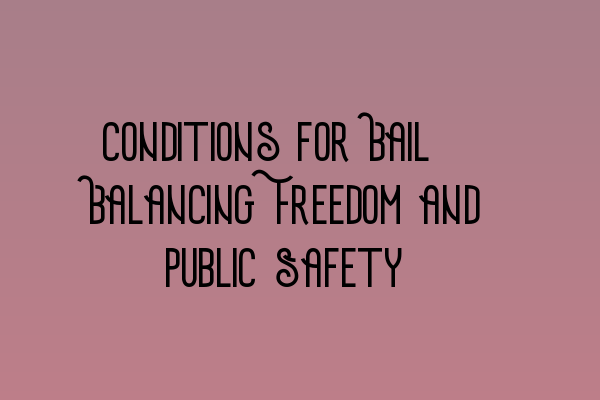Conditions for Bail: Balancing Freedom and Public Safety
When it comes to the criminal justice system, one crucial aspect is determining whether an individual should be granted bail or not. Bail allows individuals to be released from custody while awaiting their trial, providing them with a certain level of freedom. However, this freedom must be balanced with the need to ensure public safety. In this article, we will explore the conditions for bail and how they help strike this delicate balance.
Importance of Bail Conditions
Bail conditions are rules and requirements imposed on an individual who has been granted bail. These conditions aim to address concerns regarding flight risk, reoffending, and protection of the public. By setting these conditions, the court can minimize the potential risks associated with releasing an individual before their trial.
Bail conditions can vary depending on the circumstances of each case and the individual involved. Some common conditions include:
- Regular reporting to a police station
- Surrendering of travel documents
- Restrictions on travel
- Curfews
- Non-contact orders
- Prohibition of drug or alcohol consumption
The Role of Bail in Presumption of Innocence
One fundamental principle of criminal law is the presumption of innocence. This principle dictates that an individual is considered innocent until proven guilty. Bail allows individuals to maintain their freedom and continue with their lives until they are proven guilty beyond a reasonable doubt.
By imposing conditions on bail, the court ensures that the presumption of innocence is upheld while addressing any concerns about public safety or the individual’s potential flight risk. These conditions are carefully designed to strike the right balance between protecting the public and respecting the rights of the accused.
Considerations for Bail Decision-making
When determining whether to grant bail and the appropriate conditions, several factors come into play. These considerations help the court assess the level of risk an individual may pose and tailor the conditions accordingly. Some of these factors include:
- The seriousness of the offense
- The individual’s criminal history
- The strength of the evidence against the individual
- The individual’s ties to the community
- The potential danger the individual may pose to witnesses or victims
- The individual’s mental health and substance abuse history
By thoroughly evaluating these factors, the court can make an informed decision regarding bail and the appropriate conditions to ensure public safety while upholding the rights of the accused.
Conclusion
The conditions for bail play a vital role in striking a balance between an individual’s freedom and public safety. By imposing specific rules and requirements, the court can mitigate potential risks and protect the public while ensuring that the presumption of innocence is upheld. Understanding the importance of these conditions is crucial for those involved in the criminal justice system.
For more information on the SQE Criminal Law & Practice Law UK, you may find the following articles relevant:
